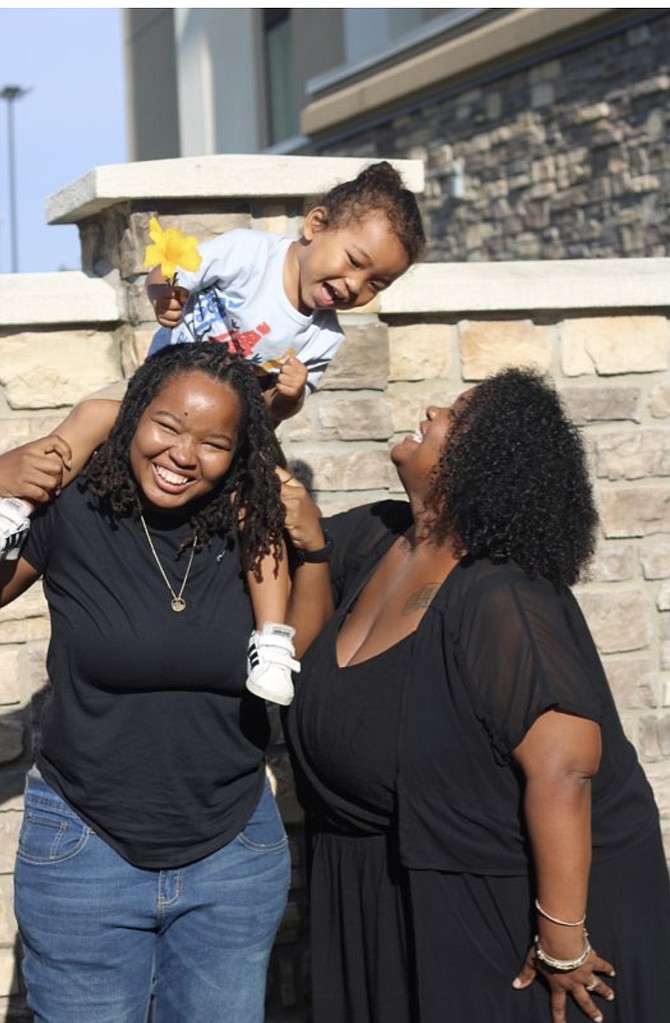Corretta Lewis, pictured with her wife Mea and their son Caleb says that she almost lost her life due racism in healthcare.

"I had a friend that died at 21 with her 3-day old baby in her arms because the doctors didn't take her seriously, so I was scared," said Lewis.
She adjusted her diet but the discomfort persisted.
"I nearly died while in labor with my son and then I was dismissed by my OB-GYN during postnatal care," she said. "After giving birth, I was still experiencing severe chest pain and after a few weeks my wife forced me to go to another doctor to have them look into it further."
A cardiologist ordered an echocardiogram. "It turns out that the doctor saw something on an ultrasound of my heart," said Lewis. "I could have died. I was dismissed because I was a young black woman."
Lewis' experience is not uncommon. Black women are three-to-four times more likely to die of pregnancy-related causes at a higher rate than white women in Northern VIrginia and parts of Montgomery County. A lack of access to healthcare and racism from medical professionals are among the top reasons for this gap.
Most pregnancy-related deaths are preventable, according to the CDC. Racial and ethnic disparities in pregnancy-related deaths have persisted over time, the CDC reports. Even in states with the lowest pregnancy-related deaths per 100,000 live births, and among women with higher levels of education, significant racial differences persist. These findings suggest that the disparity observed in pregnancy-related death for Black and American Indian/Alaska Native women is a complex national problem, according to the CDC. https://www.cdc.gov/media/releases/2019/p0905-racial-ethnic-disparities-pregnancy-deaths.html
"Institutional racism, implicit bias, toxic stress, and intimate partner violence … are contributing factors to the staggering disparity among black women," said Joanna Hemmat, assistant director, Health Services Division, Fairfax County Health Department.
The actions that are associated with these behaviors are dismissing a patient's symptoms, making assumptions and generalizing.
"We work on addressing institutional racism and implicit bias –in collaboration with One Fairfax, our county-wide initiative to bring an equity lens to all areas of operation throughout the county, including health,” Hemmat said.
“Institutional racism, implicit bias, toxic stress, and intimate partner violence … are contributing factors to the staggering disparity among black women."
— Joanna Hemmat, Health Services Division. Fairfax County Health Department
A lack of access to prenatal and postnatal healthcare is another barrier to closing the maternal mortality gap between Black and white women. "Uninsured women are less likely to seek routine health care and more likely to receive episodic care in the emergency department," said Hemmat, "The diagnosis and management of chronic health conditions may be delayed and follow-up care is not coordinated."
To address the issue of a lack of healthcare, local counties are partnering with medical facilities to offer services on a sliding scale for uninsured patients. For example, Arlington County teams up with the Virginia Hospital Center to provide services to pregnant women, says Kurt Larrick, assistant director of Arlington County Department of Human Services. "They do all deliveries and we actually send any high risk pregnancies to them immediately as well," he said.
Addressing pre-existing medical conditions and creating an overall healthy lifestyle can help lower maternal mortality rates among women of color.
"Mental Health screening, screening for intimate partner violence and substance use, as well as subsequent referrals, are essential components of care provision during the prenatal and postpartum periods. In order to reduce maternal deaths due to suicide, overdose, and intimate partner violence," said Hemmat.
Though she survived her pregnancy and now has a happy family of three, Lewis is still concerned about the plight of other women of color.
"It's not asking a lot for all black women to live long enough to see the child they carried celebrate their first birthday, and many others,” Lewis said.
